#eugenie grandet
Explore tagged Tumblr posts
Text

Eugénie Grandet, Balzac
157 notes
·
View notes
Text

My favorite moment from Eugenie Grandet
#Had to read the book for a course#Honestly? It wasn't that bad#Aside from the antisemitism#And sexism#And incest#I actually enjoyed reading it and it can be funny at a time#Balzac treats his characters as real people#Which is niceug#Enjoyed it a lot more than I thought I would#Eugenie Grandet#Eugénie Grandet#honoré de balzac#balzac#french literature#Madame Grandet#Monsieur Grandet
0 notes
Text
…Moliere và Balzac là hai trong sốnhững tác gia có đóng góp đáng kểcho nền văn học thếgiới. Cuộc đời và sựnghiệp sáng tác của họ đã đểlại trong lòng người đọc rất nhiều ấn tượng sâu sắc. Molier được coi là người đã sáng lập ra hài kịch cổ điển Pháp thếkỉXVII và đưa nó tới đỉnh cao xán lạn. St Beuve đã nhận xét : “Nếu có một đại hội các thiên tài văn học cổkim trên thếgiới thì người đại diện cho văn học Pháp phải là Moliere”. Và không phải ngẫu nhiên mà “trong 209 tác giả được Balzac nhắc tới trong tác phẩm của mình, Moliere đứng đầu với 240 lần” (Theo J.Belatre). Mặc dù sinh ra trong một gia đình tưsản hầu cận nhà vua, có một cuộc sống khá vất vảvà khó khăn nhưng bằng tài năng và lòng yêu thích nghệ thuật đặc biệt là kịch, ông đã sáng tạo nên những tác phẩm để đời. Trong những tác phẩm của ông chất hài kịch rất đậm nét. Thông qua tiếng cười để phê phán, đảkích thói xấu xa của giai cấp quí tộc, tăng lữ, phong kiến Pháp, thểhiện quan điểm của ông trước hiện thực xã hội. Những thăng trầm và trải nghiệm trong cuộc sống đã là chất liệu và cảm hứng đểMolier kiến tạo ra những tác phẩm hài kịch đặc sắc…
0 notes
Text
MORTIMER ADLER’S READING LIST (PART 2)
Reading list from “How To Read a Book” by Mortimer Adler (1972 edition).
Alexander Pope: Essay on Criticism; Rape of the Lock; Essay on Man
Charles de Secondat, baron de Montesquieu: Persian Letters; Spirit of Laws
Voltaire: Letters on the English; Candide; Philosophical Dictionary
Henry Fielding: Joseph Andrews; Tom Jones
Samuel Johnson: The Vanity of Human Wishes; Dictionary; Rasselas; The Lives of the Poets
David Hume: Treatise on Human Nature; Essays Moral and Political; An Enquiry Concerning Human Understanding
Jean-Jacques Rousseau: On the Origin of Inequality; On the Political Economy; Emile, The Social Contract
Laurence Sterne: Tristram Shandy; A Sentimental Journey through France and Italy
Adam Smith: The Theory of Moral Sentiments; The Wealth of Nations
Immanuel Kant: Critique of Pure Reason; Fundamental Principles of the Metaphysics of Morals; Critique of Practical Reason; The Science of Right; Critique of Judgment; Perpetual Peace
Edward Gibbon: The Decline and Fall of the Roman Empire; Autobiography
James Boswell: Journal; Life of Samuel Johnson, Ll.D.
Antoine Laurent Lavoisier: Traité Élémentaire de Chimie (Elements of Chemistry)
Alexander Hamilton, John Jay, and James Madison: Federalist Papers
Jeremy Bentham: Introduction to the Principles of Morals and Legislation; Theory of Fictions
Johann Wolfgang von Goethe: Faust; Poetry and Truth
Jean Baptiste Joseph Fourier: Analytical Theory of Heat
Georg Wilhelm Friedrich Hegel: Phenomenology of Spirit; Philosophy of Right; Lectures on the Philosophy of History
William Wordsworth: Poems
Samuel Taylor Coleridge: Poems; Biographia Literaria
Jane Austen: Pride and Prejudice; Emma
Carl von Clausewitz: On War
Stendhal: The Red and the Black; The Charterhouse of Parma; On Love
Lord Byron: Don Juan
Arthur Schopenhauer: Studies in Pessimism
Michael Faraday: Chemical History of a Candle; Experimental Researches in Electricity
Charles Lyell: Principles of Geology
Auguste Comte: The Positive Philosophy
Honore de Balzac: Père Goriot; Eugenie Grandet
Ralph Waldo Emerson: Representative Men; Essays; Journal
Nathaniel Hawthorne: The Scarlet Letter
Alexis de Tocqueville: Democracy in America
John Stuart Mill: A System of Logic; On Liberty; Representative Government; Utilitarianism; The Subjection of Women; Autobiography
Charles Darwin: The Origin of Species; The Descent of Man; Autobiography
Charles Dickens: Pickwick Papers; David Copperfield; Hard Times
Claude Bernard: Introduction to the Study of Experimental Medicine
Henry David Thoreau: Civil Disobedience; Walden
Karl Marx: Capital; Communist Manifesto
George Eliot: Adam Bede; Middlemarch
Herman Melville: Moby-Dick; Billy Budd
Fyodor Dostoevsky: Crime and Punishment; The Idiot; The Brothers Karamazov
Gustave Flaubert: Madame Bovary; Three Stories
Henrik Ibsen: Plays
Leo Tolstoy: War and Peace; Anna Karenina; What is Art?; Twenty-Three Tales
Mark Twain: The Adventures of Huckleberry Finn; The Mysterious Stranger
William James: The Principles of Psychology; The Varieties of Religious Experience; Pragmatism; Essays in Radical Empiricism
Henry James: The American; ‘The Ambassadors
Friedrich Wilhelm Nietzsche: Thus Spoke Zarathustra; Beyond Good and Evil; The Genealogy of Morals; The Will to Power
Jules Henri Poincare: Science and Hypothesis; Science and Method
Sigmund Freud: The Interpretation of Dreams; Introductory Lectures on Psychoanalysis; Civilization and Its Discontents; New Introductory Lectures on Psychoanalysis
George Bernard Shaw: Plays and Prefaces
Max Planck: Origin and Development of the Quantum Theory; Where Is Science Going?; Scientific Autobiography
Henri Bergson: Time and Free Will; Matter and Memory; Creative Evolution; The Two Sources of Morality and Religion
John Dewey: How We Think; Democracy and Education; Experience and Nature; Logic; the Theory of Inquiry
Alfred North Whitehead: An Introduction to Mathematics; Science and the Modern World; The Aims of Education and Other Essays; Adventures of Ideas
George Santayana: The Life of Reason; Skepticism and Animal Faith; Persons and Places
Lenin: The State and Revolution
Marcel Proust: Remembrance of Things Past
Bertrand Russell: The Problems of Philosophy; The Analysis of Mind; An Inquiry into Meaning and Truth; Human Knowledge, Its Scope and Limits
Thomas Mann: The Magic Mountain; Joseph and His Brothers
Albert Einstein: The Meaning of Relativity; On the Method of Theoretical Physics; The Evolution of Physics
James Joyce: ‘The Dead’ in Dubliners; A Portrait of the Artist as a Young Man; Ulysses
Jacques Maritain: Art and Scholasticism; The Degrees of Knowledge; The Rights of Man and Natural Law; True Humanism
Franz Kafka: The Trial; The Castle
Arnold J. Toynbee: A Study of History; Civilization on Trial
Jean Paul Sartre: Nausea; No Exit; Being and Nothingness
Aleksandr Solzhenitsyn: The First Circle; The Cancer Ward
Source: mortimer-adlers-reading-list
#reading list#long post#mortimer adler#text#saved posts#works#books#so much to read#philosophy#literature#dark academia#light academia
8 notes
·
View notes
Text
Page 2

✦Carla Juri
Paula 2016 — under development
✦César Domboy
Eugenie Grandet 2021— under development
✦Callum Turner
Victor Frankenstein 2015 — part 1
✦Cate Blanchett
An Ideal Husband 1999 — under development Bordertown 1995 — part 1, part 2, part 3, part 4, part 5, part 6, part 7 Elizabeth 1998 — under development Oscar and Lucinda 1997 — under development Robin Hood 2010 — under development
✦Charity Wakefield
Sense and Sensibility 2008 — (690 x 388px), (300 x 169px) Wolf Hall
✦Charlie Rowe
Never let me go — part 1, part 2 Vanity Fair 2018 — under development
✦Chiara Mastroianni
Augustine 2012 — part 1, part 2 Linhas de Wellington 2012 — under development Marcel Proust's Time Regained 1999 — under development
✦Christian Bale
Little Women 1994 — part 1, part 2, part 3, part 4, part 5, part 6, part 7 A Midsummer Night's Dream 1999 — under development The Prestige 2006 — under development
✦Christoph Waltz
Dorian 2003 — under development Fire and Sword — (690 x 388px), (300 x 169px) Parole Chicago 1979— (598 x 448px), (300 x 225px)



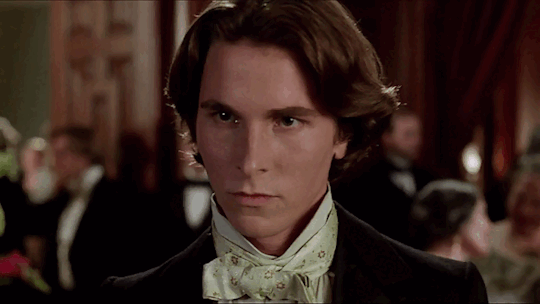


7 notes
·
View notes
Photo
All of the academia essentials are here.
Sense and Sensibility - Jane Austen
The Great Gatsby - N. Scott Fitzgerald
Brideshead Revisited - Evelyn Waugh
The Rebel - Albert Camus
Pride and Prejudice - Jane Austen
Animal Farm - George Orwell
Siddhartha - Hermann Hesse
Last Days of Socrates - Plato
Nineteen Eighty-Four - George Orwell
The Iliad - Homer
Eugenie Grandet - Honore de Balzac
Lolita - Vladimir Nabokov
Moby Dick - Herman Melville
Candide - Voltaire
Wuthering Heights - Emily Bronte
Orlando - Virginia Woolf
The Fall of the House of Usher - Edgar Allen Poe
Goodbye, Columbus - Philip Roth
Nausea - Jean Paul Sartre
The Odyssey - Homer
Fahrenheit 451 - Ray Bradbury
The Picture of Dorian Gray - Oscar Wilde
The Grapes of Wrath - John Steinbeck
Tropic of Cancer - Henry Miller
The Brothers Karamazov - Fyodor Dostoevsky
The Ship - C.S. Forester
The General - C.S. Forester
Kim - Rudyard Kipling
Cheri and the Last of Cheri - Colette
The Good Soldier: Schweik - Jaroslav Hašek
Romeo and Juliet - William Shakespeare
Maggie: A Girl of the Streets - Stephen Crane
One Flew Over the Cuckoo's Nest - Ken Kesey
Rebecca - Daphne du Maurier
The Laurel Poetry Series - Edgar Allan Poe
The Histories - Herodotus
When the Going Was Good - Evelyn Waugh
Brave New World - Aldous Huxley
The Sun Also Rises - Ernest Hemingway
The Deerslayer - James Fenimore Cooper
Tess of the d'Urbervilles - Thomas Hardy
20,000 Thousand Leagues Under the Sea - Jules Verne
Something Wicked This Way Comes - Ray Bradbury

#dark academia#chaotic academia#light academia#ernest hemingway#emily bronte#jane austen#thomas hardy#william shakespeare#ray bradbury#bookblr#george orwell#the great gatsby#oscar wilde#rudyard kipling#jules verne#literature#books#classic books
6K notes
·
View notes
Text
If I'd had a man of my own, I'd have followed him . . . down to hell.
Balzac, Eugenie Grandet
0 notes
Text
Part 181: Saturday, 25th December 1965, 10.25p.m.
.A very brief entry, want to see second instalment of Eugenie Grandet on TV at 10.35. Pain in left shoulder-blade yesterday, quite a definite pain. Gone to-day (except perhaps for a very slight twinge if I think about it, but I didn’t have to think about yesterday’s pain). It’s the schmallippiger Antlitz des Lebens [allusion to Thomas Mann’s “Royal Highness”. The prince’s educator, Doctor…
View On WordPress
0 notes
Text
Aspettando l'Autunno Book Tag
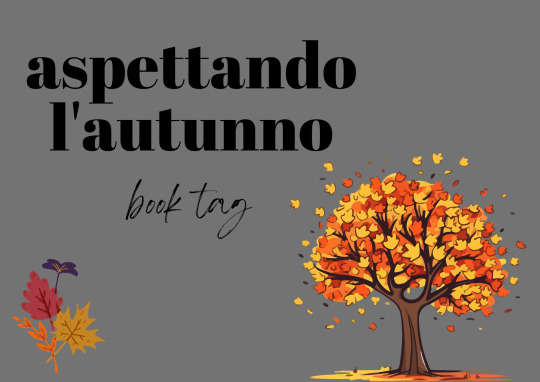
Ciao a tutti!! Questa settimana vi propongo un nuovo book tag trovato sul Book Tube. Oggi parliamo di autunno, in particolare vi mostro libri già letti e libri che vorrei leggere con vibes autunnali. Scrivetemi pure i vostri titoli autunnali!! Buona lettura!!
Pioggia: un libro che leggeresti volentieri cullato dal ticchettio della pioggia sul tetto.

"Il Sospetto" di Friedrich Durrenmatt è un romanzo breve che lessi lo scorso anno, proprio nel periodo autunnale e ricordo di averlo apprezzato moltissimo anche per le vibes tetre che pone al lettore. Perfetto da leggere in una giornata piovosa.
Foliage: un libro dalle diverse sfaccettature.

Passiamo, ora, alla letteratura americana del novecento con "Giovanni's Room", o "La Stanza di Giovanni", di James Baldwin. Questo romanzo narra di una relazione alquanto complicata tra due ragazzi a Parigi, ma questo è solo il punto di partenza che l'autore usa per poter parlare di ben altro: la società dell'epoca, la libertà personale, la solitudine.
Autunno, Dove Sei?: nomina quattro libri che non vedi l’ora di leggere quando arriverà la stagione.
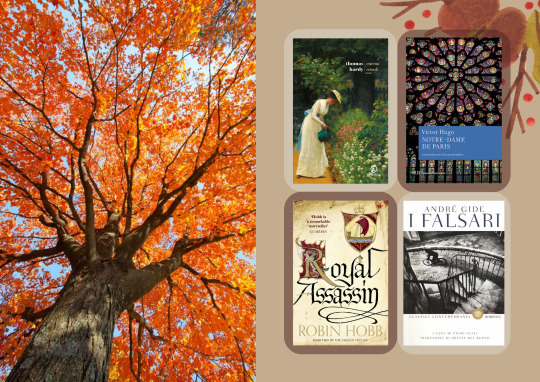
Sono molto curiosa di proseguire il mio percorso di lettura degli autori Thomas Hardy e Victor Hugo con, rispettivamente, "Estremi Rimedi" e "Notre-dame de Paris". Parlando sempre di classici, vorrei approcciarmi ad André Gide con la sua ultima opera "I Falsari". Infine, cambiando completamente genere, vorrei proseguire con la trilogia Farseer di Robin Hobb, leggendo il secondo volume "Royal Assassin".
Tè e Tisana: un libro che scalda il cuore.
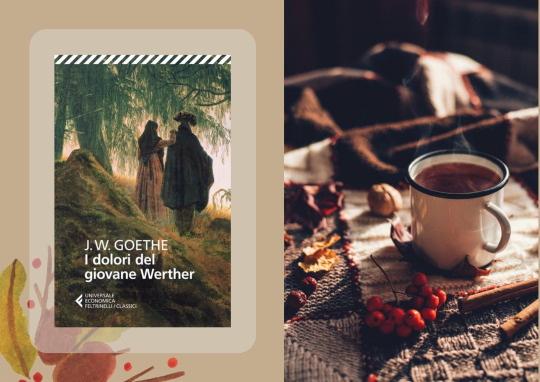
"I Dolori del Giovane Werther" di Goethe può sembrare un libro triste, e lo è, ma nella sua tristezza porta molto calore. Questo è un romanzo estremamente interiore, che parla di solitudine, di amore, di morte. Non ci si sente soli, ci si sente capiti e a propria volta si capisce.
Castagne: un libro che all’inizio ci sembrava un po’ spinoso, difficile ma che poi si è rivelato coinvolgente.
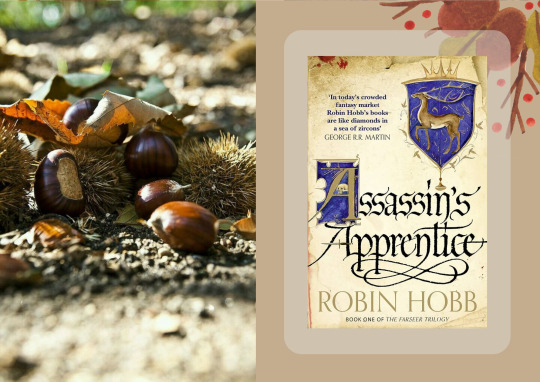
"Assassin's Apprentice" di Robin Hobb è il primo volume della trilogia Farseer (che apre una saga infinita); per me questa è stata una lettura alquanto impegnativa, in particolar modo per l'inglese che non ho trovato così facile come mi aspettavo. Una volta, però, abituatami allo stile, la lettura è diventata molto più scorrevole. Per quanto riguarda la trama, invece, questa mi ha catturato sin da subito, un po' intricata, ma decisamente accattivante.
Candele Profumate: un libro dalla forte atmosfera autunnale.
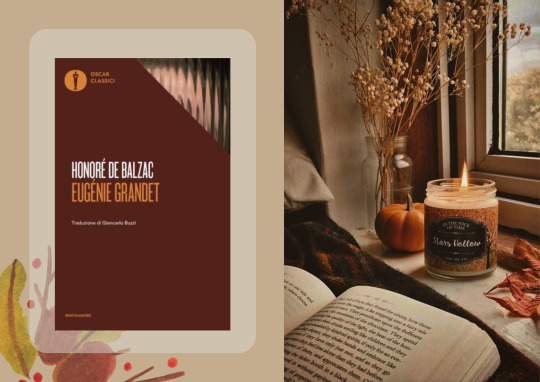
Nonostante "Eugenie Grandet" di Balzac sia ambientato in più anni e, quindi, in più stagioni, mi ha trasmesso molte vibes autunnali. Che dire di questo romanzo, si incentra sulla figura femminile di Eugenie Grandet, personaggio che non segue perfettamente i canoni di quell'epoca e, di conseguenza, molto interessante.
Zucca: un mattone da leggere in autunno.
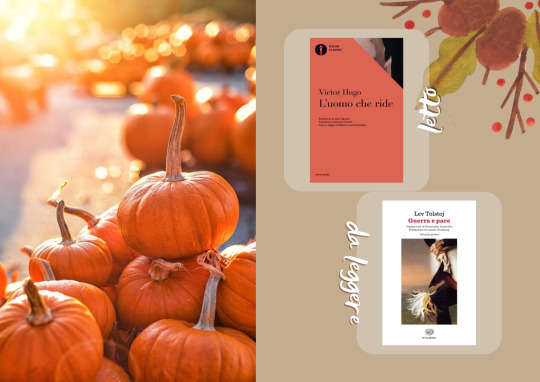
Qui, vi cito due libri, uno letto e uno da leggere. "L'Uomo che Ride" di Victor Hugo è un romanzo gotico estremamente drammatico, ma con un messaggio potentissimo e perfetto per l'autunno. Invece, questo autunno mi piacerebbe affrontare la sfida di "Guerra e Pace" di Tolstoj, ma vedremo in seguito come va...
Halloween: un libro che vuoi leggere quest’anno per halloween.
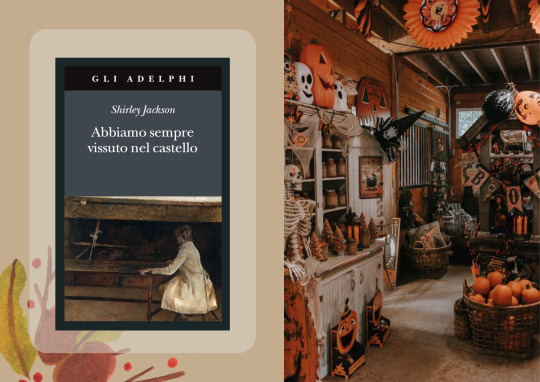
Non ho mai letto romanzi horror, ma quest'anno mi voglio buttare, perciò mi sono già preparata in libreria "Abbiamo Sempre Vissuto nel Castello" di Shirley Jackson, autrice ben conosciuta del novecento. Non so nulla di questo romanzo, come d'altronde di ogni romanzo che devo ancora leggere, e non so minimamente cosa aspettarmi.
Giacca: libro che hai da un po’ in libreria e che aspetti di leggere proprio in autunno.

È da Natale 2022 che attendo il suo momento e, per me, il suo momento è l'autunno. Sto parlando di "Spiriti e Creature del Giappone" illustrato da Benjamin Lacombe. Una raccolta di racconti giapponesi su creature mistiche, cosa c'è di meglio per una lettura autunnale!!
#book tag#booktag#book#books#libri#libro#tag#letteratura#literature#consigli di lettura#suggestions#tbr#to be read#reading
1 note
·
View note
Text

gorgeous edition of Eugénie Grandet❤️
4 notes
·
View notes
Text
Artist, by Kalliope Amorphous

"Hangi durumda olursa olsun, kadınların erkeklerden daha fazla acı çekme nedenleri vardır, bu yüzden erkeklerden daha çok acı çekerler. Erkek güçlüdür, gücünün etkisini gösterir: Gider, gelir, düşünür, bir şeyler yapmaya çalışır, geleceği anlayıp teselli bulur. Charles da işte böyle yapıyordu. Ama kadın, yaşadığı yerde, hiçbir şeyin avutamadığı kederiyle baş başadır; kederin açmış olduğu uçurumun dibine kadar iner, derinliğini ölçer; onu, genellikle duaları ve gözyaşlarıyla doldurur. Eugénie de böyle yapıyordu."
Honore de Balzac | Eugenie Grandet
#honore de balzac#Eugenie Grandet#yazar#kitap#edebiyat#kitapalıntıları#kitapalıntısı#art#artist#kalliope amorphous#kadınlar#kadın#acı aşk#keşfet#cumblus kitap
34 notes
·
View notes
Text
"sararmış bir ince dalsın, ama ben sarıyı severim."
30 notes
·
View notes
Text
Eugenie Grandet, Balzac. L'ho letto con piacere e riconosco la bravura tecnica dell'autore, in particolare le descrizioni e i personaggi sono magistrali. D'altro canto non posso non ammettere che dopo averlo finito ho pensato "e allora?"
1 note
·
View note
Text
Page 9

✦Anna Friel
Cadfael S02E03 — under development A Midsummer Night's Dream 1999 — under development
✦Catherine Mouchet
The Monk 2011 — part 1, part 2, part 3
✦Déborah François
Dombais et fils 2007 — under development The Monk 2011 — part 1, part 2 L'état sauvage 2019 Never Grow Old 2019 Fleur de tonnerre 2016 Mes cheres etudes 2010 Les fourmis rouges 2007
✦Dominic West
A Midsummer Night's Dream 1999 — under development
✦Frédéric Noaille
The Monk 2011 — part 1, part 2
✦Joséphine Japy
Eugenie Grandet 2021— under development The Monk 2011 — (690 x 388px), (300 x 169px)
✦Kevin Kline
A Midsummer Night's Dream 1999 — under development
✦María Valverde
La carga 2016 — part 1, part 2, part 3, part 4, part 5, part 6, part 7, part 8 Libertador 2013 — part 1, part 2, part 3, part 4 Los Borgia 2006 — part 1, part 2, part 3, part 4, part 5, part 6, part 7, part 8, part 9 Melissa P. 2005 — part 1, part 2, part 3, part 4, part 5, part 6, part 7, part 8
✦Paz Vega
Carmen 2003 — under development Los Borgia 2006 — part 1, part 2, part 3 One Thousand and One Nights 2012 — under development
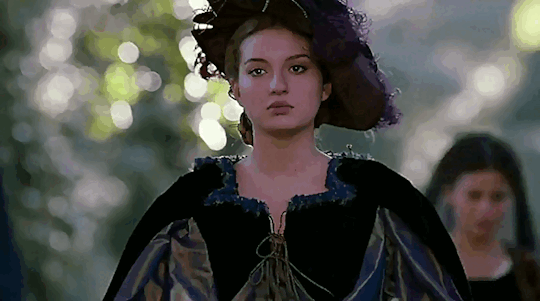
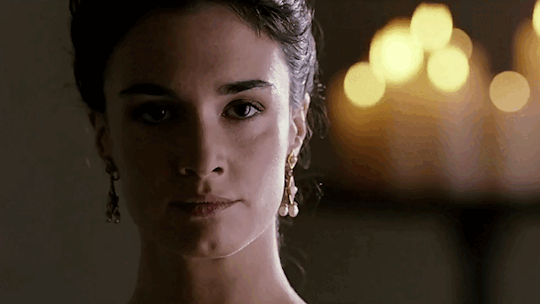
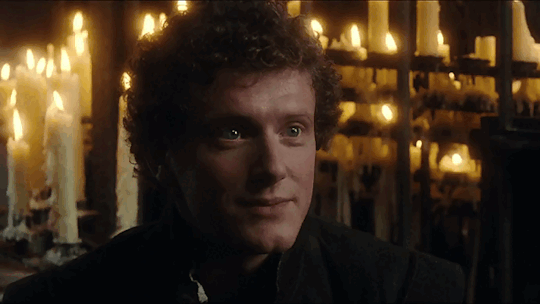
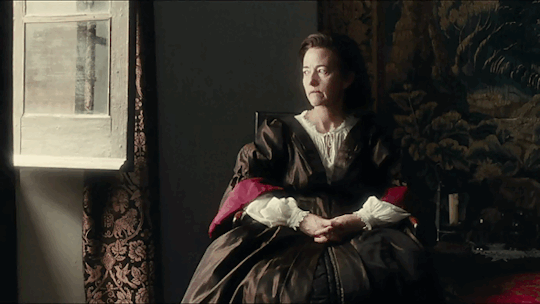

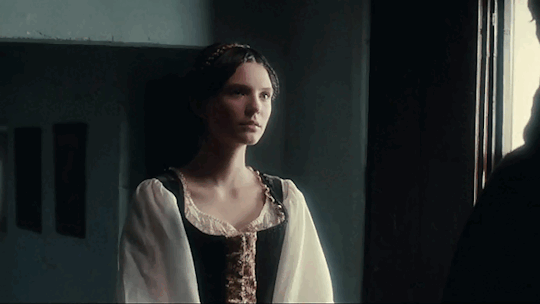

4 notes
·
View notes
Quote
You ask me for details about Victor Hugo: Victor Hugo is an extremely brilliant man; of as much wit as poetry. He is most fascinating in conversation, a little like [Alexander] Humboldt, but superior, and more amenable to dialogue. He is full of bourgeois ideas. He execrates Racine, whom he considers a secondary man. He's mad on that point. There's more good than evil in him--though the good is an outcome of vanity and all things are deeply calculated in him--he is, in the main, a charming man, besides being the great poet that he is. He has lost much of his quality, force, and value by the life he leads.
Honoré de Balzac describes fellow author and close friend, Victor Hugo, to his future wife, Eveline Hańska, in a letter dated July 3, 1840.
#honore de balzac#Victor Hugo#eveline hanska#Les Misérables#pere goriot#cousin bette#The Human Comedy#The Hunchback of Notre Dame#eugenie grandet#lost illusions#Authors on Authors#french literature#classic literature#opinion#letter#novelists#great literature#vic would later eulogize balzac @ his funeral#fun facts
114 notes
·
View notes
Text
A thousand confused thoughts came to birth in her mind and grew there, as the sunbeams grew without along the wall… Her thoughts were all in keeping with the details of this strange landscape, and the harmonies of her heart blended with the harmonies of nature. When the sun reached an angle of the wall where the “Venus-hair” of southern climes drooped its thick leaves, lit with the changing colors of a pigeon’s breast, celestial rays of hope illumined the future to her eyes, and thenceforth she loved to gaze upon that piece of wall, on its pale flowers, its blue harebells, its wilting herbage, with which she mingled memories as tender as those of childhood. The noise made by each leaf as it fell from its twig in the void of that echoing court gave answer to the secret questionings of the young girl.
Balzac, Eugenie Grandet
0 notes